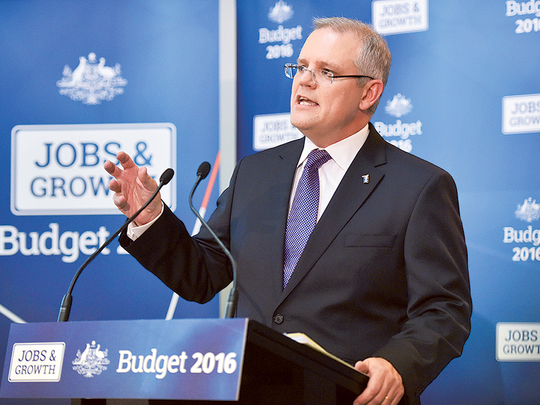
Sydney: Australia injected a double-dose of stimulus as the government handed down an expansionary budget hours after the central bank eased policy for the first time in a year.
Treasurer Scott Morrison forecast a A$37.1 billion ($28 billion) deficit in the 12 months through June 2017, wider than he predicted six months ago. His plan for growth: cut company taxes, boost infrastructure spending and provide income-tax relief. That’s assuming he remains in office following an expected July 2 election.
“The government, in a challenging budget environment, is making responsible choices in its national economic plan to support jobs and growth,” Morrison said Tuesday. “The Australian economy is transitioning from the largest mining investment boom in its history to broader-based growth.”
Australia’s fiscal and monetary authorities worked in tandem to help ward off disinflation and sluggish growth that are plaguing much of the developed world. Their aim: to drive growth and hiring that encourages firms to invest and households to spend, in an economy that’s increasingly reliant on service industries.
Five hours before the budget’s release, Reserve Bank of Australia Governor Glenn Stevens cut interest rates to a fresh record low of 1.75 per cent. He cited the “lower outlook” for consumer-price growth as global disinflation seeps into the local economy. Stevens repeated that the resurgent Aussie dollar, which has climbed as much as 15 per cent since mid-January, could complicate the economy’s adjustment.
“I think there’s a number of factors” in the RBA’s decision to cut rates, Morrison said in an interview with Bloomberg Television. “They’re all pretty much focused on the inflation side of things. They don’t, I believe, relate to any exchange rate issues. Glenn Stevens is doing his job, I’m doing mine.”
The RBA chief said Tuesday that the labour market, where hiring reached a record late last year and unemployment fell to a 2 1/2-year low in March, has shown “more mixed” indicators lately. Morrison’s budget forecast the jobless rate to drop to 5.5 per cent next fiscal year from the current 5.7 per cent, with the economy growing 2 1/2 per cent over the period.
Net debt, meanwhile, is predicted to climb to a record 18.9 per cent of gross domestic product in the fiscal year through June 2017, and rise again to 19.2 per cent in the ensuing 12 months. While that compares favourably with the International Monetary Fund’s 69.3 per cent forecast for Europe this year, the trajectory of Australia’s is worse.
Balanced Objective
Still, the government says it will balance the books. Morrison reiterated the budget will return to surplus by 2021 from a forecast deficit of 2.2 per cent of GDP next fiscal year. In the short-term, Morrison plans to pay for Tuesday’s economic program through savings measures as well as higher taxes on tobacco and wealthy people’s pension plans.
Morrison and his boss, Prime Minister Malcolm Turnbull, enjoyed an initial economic windfall after ousting Joe Hockey and Tony Abbott as treasurer and leader. Growth accelerated, unemployment dropped and iron ore rose more than 50 per cent.
Yet at a political level, they overreached on potential policy reform — particularly tax — and were later forced to rule out measures including an increase in the consumption tax. Those hasty retreats later lowered the government’s standing with the electorate.
Policies announced Tuesday included creating jobs and investment by kick-starting an east coast rail link between Brisbane and Melbourne as well as providing funds to build dams, pipelines and roads.
The government will also lower the tax rate for small businesses to 27.5 per cent and pledged a 25 per cent rate for all companies within a decade. For workers, a 37 per cent income tax rate will kick in at A$87,000 instead of the current A$80,000.
It’s not a time for “increasing the tax burden on our economy,” Morrison said. “Such policies are not a plan for jobs and growth, they simply put our successful economic transition at risk.”












